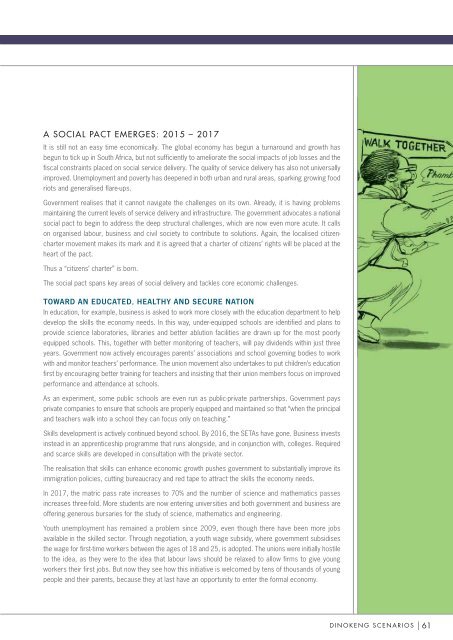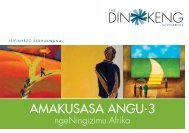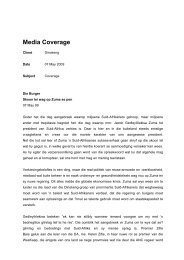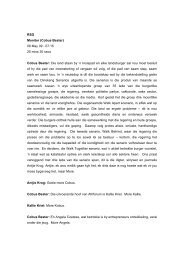Dinokeng Scenarios
Dinokeng Scenarios
Dinokeng Scenarios
You also want an ePaper? Increase the reach of your titles
YUMPU automatically turns print PDFs into web optimized ePapers that Google loves.
A SOCIAL PACT EMERGES: 2015 – 2017<br />
It is still not an easy time economically. The global economy has begun a turnaround and growth has<br />
begun to tick up in South Africa, but not sufficiently to ameliorate the social impacts of job losses and the<br />
fiscal constraints placed on social service delivery. The quality of service delivery has also not universally<br />
improved. Unemployment and poverty has deepened in both urban and rural areas, sparking growing food<br />
riots and generalised flare-ups.<br />
Government realises that it cannot navigate the challenges on its own. Already, it is having problems<br />
maintaining the current levels of service delivery and infrastructure. The government advocates a national<br />
social pact to begin to address the deep structural challenges, which are now even more acute. It calls<br />
on organised labour, business and civil society to contribute to solutions. Again, the localised citizencharter<br />
movement makes its mark and it is agreed that a charter of citizens’ rights will be placed at the<br />
heart of the pact.<br />
Thus a “citizens’ charter” is born.<br />
The social pact spans key areas of social delivery and tackles core economic challenges.<br />
TOWARD AN EDUCATED, HEALTHY AND SECURE NATION<br />
In education, for example, business is asked to work more closely with the education department to help<br />
develop the skills the economy needs. In this way, under-equipped schools are identified and plans to<br />
provide science laboratories, libraries and better ablution facilities are drawn up for the most poorly<br />
equipped schools. This, together with better monitoring of teachers, will pay dividends within just three<br />
years. Government now actively encourages parents’ associations and school governing bodies to work<br />
with and monitor teachers’ performance. The union movement also undertakes to put children’s education<br />
first by encouraging better training for teachers and insisting that their union members focus on improved<br />
performance and attendance at schools.<br />
As an experiment, some public schools are even run as public-private partnerships. Government pays<br />
private companies to ensure that schools are properly equipped and maintained so that “when the principal<br />
and teachers walk into a school they can focus only on teaching.”<br />
Skills development is actively continued beyond school. By 2016, the SETAs have gone. Business invests<br />
instead in an apprenticeship programme that runs alongside, and in conjunction with, colleges. Required<br />
and scarce skills are developed in consultation with the private sector.<br />
The realisation that skills can enhance economic growth pushes government to substantially improve its<br />
immigration policies, cutting bureaucracy and red tape to attract the skills the economy needs.<br />
In 2017, the matric pass rate increases to 70% and the number of science and mathematics passes<br />
increases three-fold. More students are now entering universities and both government and business are<br />
offering generous bursaries for the study of science, mathematics and engineering.<br />
Youth unemployment has remained a problem since 2009, even though there have been more jobs<br />
available in the skilled sector. Through negotiation, a youth wage subsidy, where government subsidises<br />
the wage for first-time workers between the ages of 18 and 25, is adopted. The unions were initially hostile<br />
to the idea, as they were to the idea that labour laws should be relaxed to allow firms to give young<br />
workers their first jobs. But now they see how this initiative is welcomed by tens of thousands of young<br />
people and their parents, because they at last have an opportunity to enter the formal economy.<br />
DINOKENG SCENARIOS 61







